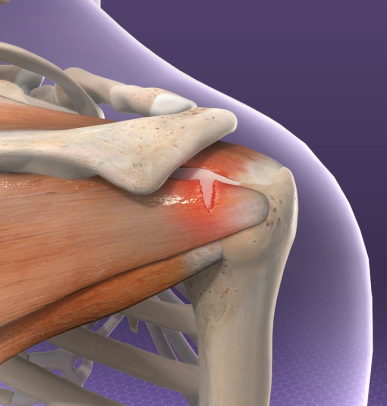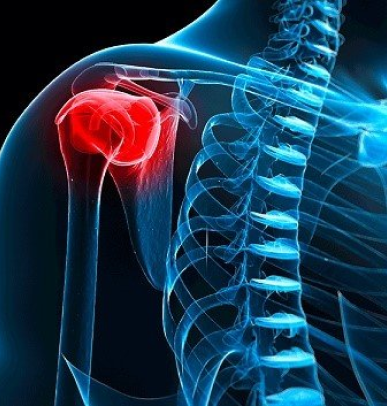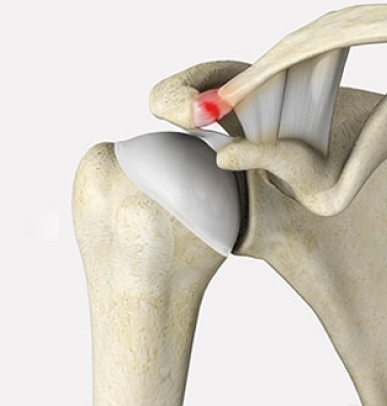Shoulder Impingement

What is Shoulder Impingement?
Shoulder impingement, sometimes called swimmer’s shoulder, is a condition characterized by pain and irritation in the shoulder joint. It occurs when the tendons of the rotator cuff become pinched between the acromion and the humerus, causing inflammation.
The rotator cuff stabilizes the shoulder, allowing for a wide range of movements. When the tendons become inflamed or irritated, the space in the shoulder joint becomes even tighter, leading to further compression and potentially causing rotator cuff tendinitis or tears.
Shoulder / Arm Pain Conditions
Anatomy
Common Causes
- Repetitive overhead movements
- Aging
- Posture issues
- Bone spurs
- Previous injuries
Types of Shoulder Impingement
Syndrome can be categorized into different types based on the underlying causes. These include:

Rotator Cuff Tendinitis
Overuse typically causes inflammation in the rotator cuff tendons, resulting in swelling and pressure that leads to impingement.

Shoulder Bursitis
Inflammation of the bursa, a fluid-filled sac that cushions the rotator cuff tendons, can cause pain and impingement.

Acromion Deformity
A curved or hooked acromion (shoulder blade) can rub against the rotator cuff tendons, causing friction and impingement.
When is Shoulder Impingement Treatment Recommended?
Treatment is recommended when conservative measures, such as rest, physical therapy, or medication, do not relieve symptoms. Shoulder arthroscopy in Dubai may be considered if:
- Persistent pain that disrupts daily activities.
- Weakness or limited shoulder movement.
- Suspected or diagnosed rotator cuff tendinitis.
- Lack of improvement with non-invasive treatments.
In more serious cases, surgery may be required to remove bone spurs, repair damaged tendons, or create more space in the shoulder joint.
Candidates Eligible for Treatment
Patients who may benefit from shoulder impingement treatment include:
- Active individuals and athletes with repetitive overhead motions (e.g., swimmers, tennis players, weightlifters).
- Those with persistent rotator cuff tendinitis or shoulder pain.
- Patients who haven't found relief with physical therapy or medications.
- People with shoulder weakness, limited motion, or pain affecting daily tasks.
Treatment Options
The treatment for shoulder impingement varies depending on the severity. For mild cases, rest, physical therapy, and anti-inflammatory medications may be enough, while more severe cases may require surgery if conservative methods don’t work.
- Physical Therapy – A targeted rehabilitation program focused on strengthening the rotator cuff muscles, improving shoulder flexibility, and correcting posture can alleviate impingement symptoms.
- Medications – Nonsteroidal anti-inflammatory drugs (NSAIDs) can help reduce pain and inflammation associated.
- Steroid Injections—In persistent pain, a corticosteroid injection may reduce inflammation and provide relief.
- Shoulder Arthroscopy – Shoulder arthroscopy may be recommended if conservative measures are ineffective. Using small incisions, this minimally invasive surgery involves inserting a camera and tools to remove damaged tissue and bone spurs or repair torn rotator cuff tendons.
Consult Tarabichi Joint Care for Shoulder Arthroscopy in Dubai
At Tarabichi Joint Care, our orthopedic surgeons Dubai specialize in diagnosing and treating shoulder impingement and related conditions like rotator cuff tendinitis.
If you are struggling with shoulder pain or limited mobility, we offer advanced treatments, including shoulder arthroscopy in Dubai, to help you regain function and improve your quality of life. Contact us today to schedule a consultation and discuss your treatment options for a healthier, pain-free shoulder.
FAQ’S
Treatment for shoulder impingement typically starts with conservative methods, including rest, physical therapy, ice/heat therapy, and anti-inflammatory medications. If these methods don’t relieve symptoms, corticosteroid or PRP injections may be used.
For severe cases, arthroscopic surgery (such as acromioplasty or subacromial decompression) may be needed to remove bone spurs or inflamed tissue and increase space for the rotator cuff.
Shoulder impingement can lead to ongoing pain, reduced mobility, and weakness in the shoulder. If untreated, it may lead to rotator cuff tears, tendonitis, or bursitis, potentially requiring surgical intervention. There is a risk of recurrent impingement or complications following surgery, like infection or stiffness.
For your consultation, bring:
- Medical records (including any previous imaging like X-rays or MRIs)
- List of current medications
- Details of symptoms, including the onset, intensity, and triggers of pain
- Health insurance information (if applicable)
- Any relevant past surgeries or treatments for your shoulder or related issues
